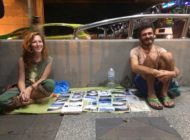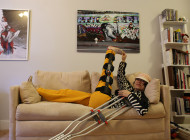Why I wrote this and where I’m coming from
I’m a PhD student, and I wrote this to try and survive the end of my semester this year. So much of academia goes off down theoretical rabbit holes, writing papers to think through abstract details that five other academics understand or care about. Linguistic theory is the worst, and this time I could barely do it.
I couldn’t sit down to write about language and race, white supremacy in America, when outside of the library it was killing people.
So this is me trying to do something that’s difficult to pull off in academia: take a theoretical, academic paper and rewrite it to get at the ideas underneath, and talk in a clearer way about something real [1]. I write from some basic understandings that I don’t have space to get into, but know that they come from a lot of critical reflection and nuanced study.
Probably the most fundamental is that we live in a society structured according to deeply-rooted systems of oppression, among them colonialism, hetero-patriarchy, capitalism, and white supremacy. This article is not intended to be Race in America 101. If you think we live in a colorblind, post-racial society, that grabbling with race is not also a white problem, please spend some time listening to people of color [2], and then come back, if so inclined.
Racism and language, or Why you can’t understand language without ideology
Sometimes it’s hard to remember that language is embodied. We tend to think of language as composed of objective words and grammatical structure. But the truth is that you can’t really interpret the meaning without taking a lot of other things into account. How did you say the phrase? Was it sarcastic, angrily shouted, said in a terrified whisper? Where were you? What were the gestures that went along with it? And, just as important, who was the person who said it, how is that body seen within a broader social context, and how does this affect the interpretation of the words?
This is why the meaning and consequence of a white man raising his hands in surrender to a police officer and saying “Don’t shoot!” is so substantively different from a Black man [3] performing the same gesture and utterance.
It’s not about objective criteria here, and it never has been. It’s not about word choice or sentence structure. It’s not (only) about context, or whether a supposedly-applied-fairly-to-everyone line of criminality has been crossed. It’s not about the letter of the law. It’s about the fact that some bodies are pre-defined as “delinquent” long before any crime is committed; one person’s “Don’t shoot” is not the same as another’s.
Everything that we do—what we say, how we act, how we dress, who we’re with, what we’re carrying etc. etc.—is interpreted, based not only on prior experience, but on the way we filter that prior experience.
Because, as anyone who studies memory knows, we remember selectively—we categorize based on assumptions and biases, not on some sort of “objective” reality.
How we’re conditioned to interpret and respond to each other based on assumptions about race
This is how we, as a society, build a racialized assumption of the “criminal.” We see a white person committing a violent act as an anomaly, a non-typical exception.
After Timothy McVeigh, no one said, “Wow, white Christians must be an inherently terrorist people.” After Sandy Hook, no one said, “Wow, white people must be inherently murderous.”
In contrast, a Black person committing a violent act (either in reality or through media representation) gets categorized into a pattern, and these expectations shape how we interpret things in the future.
And they do more than that. These expectations also affect our instinctive response.
A Black stranger hailing an individual on the street with a “Hey!” triggers a very different response from bystanders and police officers alike than a white stranger doing the same.
It’s about habit, and conditioning, but it’s also about racialized systems of power. When police officers threaten a young Black man with violence for so-called suspicious behavior, they’re acting out their interpretation of him as a criminal and compelling him to subscribe to this ideology.
So, what to do?
However, there is always agency, and people always resist being interpreted through socially-coded categories.
This is why the “Hands Up/Don’t Shoot!” gesture is so powerful; people walk with their hands upraised as an organized sign of protest and resistance [4]. It’s an attempt to call out the inherent bias in how we categorize others and subsequently interpret their behavior, and to show the consequences of this bias.
So, this was the best I could do right now to start thinking through how race-related power dynamics shape the way that our culture makes meaning. This is just a start. The question now is: how can we use this to better understand and dismantle systems of power and oppression?
[1] If you care about the academic blather: For the language stuff, I was working primarily from ideas of Pierre Bourdieu, William Hanks, Alfred Schutz, Maurice Merleau-Ponty, and Valentin Volosinov. I tried not to use their jargon (“habitus”, “stock of knowledge”, etc.) on purpose. For the sociocultural stuff (i.e. my understandings of oppressive systems) I’m coming from years of study, and didn’t use any singular text in particular. For this paper, specifically, I kinda used Louis Althusser’s (yes, the dude who strangled his wife) “interpellation” and ideas about discipline, delinquency, and normalization from Michel Foucault.
[2] It sucks that so much of the burden for educating white people has fallen on People of Color. At the same time, there is the unavoidable fact that white people, on many levels, don’t get it, can’t get it. In this, I am talking about myself, as a white woman who will be trying for a long time (probably forever) to rework some of the racial frames I’ve been trained into. If you can’t find people to educate you–an exhausting job that they really shouldn’t have to take on—go to the library and get some books centering a non-white perspective and analytical frame.
[3] Although this is a gendered issue, and I chose to use the male example here, we can’t forget that black women are the fastest growing prison population, and the trans community is also hugely relevant in this discussion.
[4] And, again, why it’s so very different for a white ally or a Black person to be making this gesture.
Tags: Ferguson inequality politics race social expectations
























1 Comment
Joy’s demystification of her professional training is admirable and helpful. I salute her observations about language, about assumptions, and about agency.
The country needs to reframe race as it has sexual orientation (not unanimously, but massively). Partly this continues to happen (with glbt persons and couples) through discrediting of the demeaning stereotypes that used to underlie the nearly ubiquitous abuse. The reframing happens in families, in workplaces, in schools, on TV, in films.
With race the white population’s fear and loathing has more systemically congealed in residential, economic, and educational segregation, which makes it harder for people to see both the lies and their own “frames.” These racially loaded patterns of perception are also supported in many other ways, among them by narratives–which, as Bryan Stevenson says, need to be changed. His book Just Mercy can change the way white people understand the situation, from the criminal justice system outward, as The New Jim Crow also does. (See Stevenson’s twenty-minute TED talk first.) His Equal Justice Initiative’s work on physical recognition of historical lynchings is a brave service. Another new book with powerful potential for re-framing the country’s understanding of race is Jason Sokol’s study of white racism in the north subsequent to WWII, All Eyes Are Upon Us.
Maybe evidence can’t reach all the layers of internalized racial framing, but it can change some of them. If we find that we have internalized some negative presumption about another group or some romanticization of our own history, we should be able to catch ourselves doing that. As Orwell says about the unconscious rationalizations of political language: if you simplify your language, purging it of the indulgences he identifies, then “when you make a stupid remark, its stupidity will be obvious, even to yourself.” Some may then go on to conceivable actions, actions that recognize the baggage many carry. Frames matter; of course they do. So does reform of police culture and of the wider culture where those cultures support the entrenched patterns that value black lives less. In most professional organizations one does not see an automatic rallying behind accused members irrespective of what has been done.
“Hands Up/Don’t Shoot” is powerful but it is also implicitly accusatory. Add to it both “Black Lives Matter” and “Cops’ Lives Matter.”
As Cornel West said years ago, “I’m not optimistic, but I remain hopeful.” The opportunities for agency are endless. Joy’s translation of her training is a form of agency, and I appreciate it.